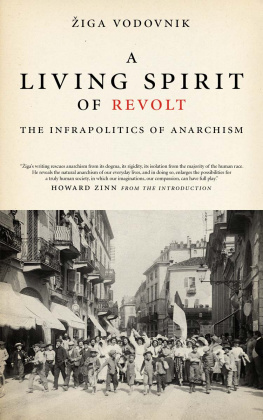P RAISE FOR A L IVING S PIRIT OF R EVOLT
The great contribution of iga Vodovnik is that his writing rescues anarchism from its dogma, its rigidity, its isolation from the majority of the human race. He reveals the natural anarchism of our everyday lives, and in doing so, enlarges the possibilities for a truly human society, in which our imaginations, our compassion, can have full play.
Howard Zinn, author of A Peoples History of the United States, from the Introduction
Like Marxs old mole, the instinct for freedom keeps burrowing, and periodically breaks through to the light of day in novel and exciting forms. That is happening again right now in many parts of the world, often inspired by, and revitalizing, the anarchist tradition that is examined in Vodovniks book. A Living Spirit of Revolt is a deeply informed and thoughtful work, which offers us very timely and instructive lessons.
Noam Chomsky, MIT
iga Vodovniks A Living Sprit of Revolt is an original and brilliant exploration of the great tapestry of theory and praxis that belongs in the anarchist tradition and its contemporary forms. For the first time he makes a striking case that the Transcendentalists and their intellectual cousins belong firmly in this tradition. No library of contemporary or historical radicalism can be without it.
James C. Scott, professor of political science and anthropology, Yale University
iga Vodovnik has made a fresh and original contribution to our understanding of anarchism, by unearthing its importance for the New England Transcendentalists and their impact on radical politics in America. A Living Spirit of Revolt is interesting, relevant, and is sure to be widely read and enjoyed.
Uri Gordon, author of Anarchy Alive: Anti-authoritarian Politics from Practice to Theory
This book with its felicitous title is an important and essential work, honest, painstaking, and intelligent. Unlike so many political scientists, iga Vodovnik understands anarchism. It is unlikely that anyone can read A Living Spirit of Revolt without gaining a wholly new perspective on the history and future of the anarchist movement. In a period that promises to spawn exciting transformations and occupations of politics, this brilliant work offers a degree of real understanding, and therefore cannot be too much commended.
Andrej Grubacic, author of Dont Mourn Balkanize! Essays After Yugoslavia and coauthor of Wobblies and Zapatistas: Conversations on Anarchism, Marxism, and Radical History
A Living Sprit of Revolt: The Infrapolitics of Anarchism
iga Vodovnik
PM Press 2013
All rights reserved. No part of this book may be transmitted by any means without permission in writing from the publisher.
PO Box 23912
Oakland, CA 94623
www.pmpress.org
Cover design by John Yates
Layout by Jonathan Rowland
ISBN: 978-1-60486-523-3
LCCN: 2012913632
10 9 8 7 6 5 4 3 2 1
Printed in the USA by the Employee Owners of Thomson-Shore in Dexter, Michigan.
www.thomsonshore.com
This book was financially supported by the Slovenian Book Agency.
Dedicated to the memory of my mother, Ana Vodovnik (19442010), and my friend Howard Zinn (19222010). In a way, they are both responsible for this book.
Contents
A F RESH L OOK AT A NARCHISM
I T IS TIME TO BREATHE SOME CLEAN, REFRESHING AIR INTO THE stale, nonsense-filled discussions of anarchism which have occupied the attention of people on all sides of the political spectrumright, left, center. This is what iga Vodovnik sets out to do in his original and imaginative analysis of anarchism.
Anarchism deserves to be liberated from all the ideological debris it has accumulated for over a hundred years. Anarchism, properly cleansed of myth and pretense, has never been more needed than in our time, when every system, every culture, has been corrupted by the profit motive or the hubris of leaders, and has led the people of the earth into a morass of injustice and violence.
The word anarchy still unsettles most people in the Western world; it suggests disorder, violence, uncertainty. We have good reasons for fearing those conditions, because we have been living with them for a long time, not in anarchist societies but in exactly those societies most fearful of anarchythe powerful nation-states of modern times. At no time in human history has there been such social chaos. Millions starving, or in prisons, or in mental institutions. Inner turmoil to the point of large-scale alienation, confusion, unhappiness. Outer turmoil symbolized by huge armies, stores of nerve gas, and stockpiles of hydrogen bombs. Wherever men, women, and children are even a bit conscious of the world outside their local borders, they have been living with the ultimate uncertainty: whether or not the human race itself will survive into the next generation. It is these conditions that the anarchists have wanted to end: to bring a kind of order to the world for the first time. We have never listened to them carefully, except through the hearing aids supplied by the guardians of disorder.
The institution of capitalism, anarchists believe, is destructive, irrational, inhumane. It feeds ravenously on the immense resources of the earth, and then churns out (this is its achievementit is an immense stupid churn) huge quantities of products. Those products have only an accidental relationship to what is most needed by people, because the organizers and distributors of goods care not about human need; they are great business enterprises motivated only by profit. Therefore, bombs, guns, office buildings, and deodorants take priority over food, homes, and recreation areas. Is there anything closer to anarchy (in the common use of the word, meaning confusion) than the incredibly wild and wasteful economic system in America?
It was both ironic and appropriate that anarchism should arise as a philosophy and guide to action exactly in that periodthe late nineteenth and early twentieth centurywhen capitalism, professing to enrich the world, kept so many in poverty, when nationalism, professing to unify people around a common identity, instead unified them in violence and war against other nations, when imperialism, professing to bring freedom and civilization to backward societies, brought them exploitation, repression, death.
What has modern civilization, with its rule of law, its giant industrial enterprises, its representative democracy, brought? Nuclear missiles already aimed and ready for the destruction of the world, and populations of a mind to accept this madness. Civilization has failed on two counts: it has perverted the natural resources of the earth, which have capacity to make our lives joyful, and also the natural resources of people, which have potential for genius and love.
It seems that revolutionary changes are neededin the sense of profound transformations of our work processes, or decision-making arrangements, our sex and family relations, our thought and culturetoward a humane society. But this kind of revolutionchanging our minds as well as institutionscannot be accomplished by customary methods: neither by military action to overthrow governments, as some tradition-bound radicals suggest, nor by that slow process of electoral reform, which traditional liberals urge on us.
As I have already written elsewhere, the state of the world today reflects the limitations of both those methods. The anarchist rather sees revolutionary change as something immediate, something we must do now, where we are, where we live, where we work. It means starting this moment to do away with authoritarian, cruel relationshipsbetween men and women, between parents and children, between one kind of worker and another kind. Such revolutionary action cannot be crushed like an armed uprising. It takes place in everyday life, in the tiny crannies where the powerful but clumsy hands of state power cannot easily reach. It is not centralized and isolated, so that it cannot be wiped out by the rich, the police, the military. It takes place in a hundred thousand places at once, in families, on streets, in neighborhoods, in places of work. It is a revolution of the whole culture. Squelched in one place, it springs up in another, until it is everywhere. Such a revolution is an art. That is, it requires the courage not only of resistance, but of imagination.
Next page






